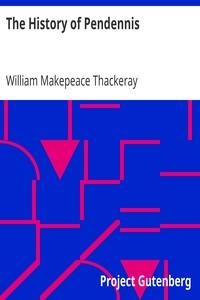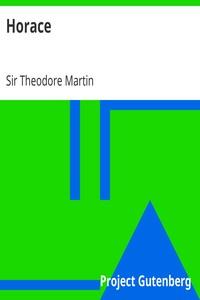Read this ebook for free! No credit card needed, absolutely nothing to pay.
Words: 59886 in 14 pages
This is an ebook sharing website. You can read the uploaded ebooks for free here. No credit cards needed, nothing to pay. If you want to own a digital copy of the ebook, or want to read offline with your favorite ebook-reader, then you can choose to buy and download the ebook.
PREFACE
No writer of antiquity has taken a stronger hold upon the modern mind than Horace. The causes of this are manifold, but three may be especially noted: his broad human sympathies, his vigorous common-sense, and his consummate mastery of expression. The mind must be either singularly barren or singularly cold to which Horace does not speak. The scholar, the statesman, the soldier, the man of the world, the town-bred man, the lover of the country, the thoughtful and the careless, he who reads much, and he who reads little, all find in his pages more or less to amuse their fancy, to touch their feelings, to quicken their observation, to nerve their convictions, to put into happy phrase the deductions of their experience. His poetical sentiment is not pitched in too high a key for the unimaginative, but it is always so genuine that the most imaginative feel its charm. His wisdom is deeper than it seems, so simple, practical, and direct as it is in its application; and his moral teaching more spiritual and penetrating than is apparent on a superficial study. He does not fall into the common error of didactic writers, of laying upon life more than it will bear; but he insists that it shall at least bear the fruits of integrity, truth, honour, justice, self-denial, and brotherly charity. Over and above the mere literary charm of his works, too--and herein, perhaps, lies no small part of the secret of his popularity--the warm heart and thoroughly urbane nature of the man are felt instinctively by his readers, and draw them to him as to a friend.
Hence it is that we find he has been a manual with men the most diverse in their natures, culture, and pursuits. Dante ranks him next after Homer. Montaigne, as might be expected, knows him by heart. Fenelon and Bossuet never weary of quoting him. La Fontaine polishes his own exquisite style upon his model; and Voltaire calls him "the best of preachers." Hooker escapes with him to the fields to seek oblivion of a hard life, made harder by a shrewish spouse. Lord Chesterfield tells us, "When I talked my best I quoted Horace." To Boileau and to Wordsworth he is equally dear. Condorcet dies in his dungeon with Horace open by his side; and in Gibbon's militia days, "on every march," he says, "in every journey, Horace was always in my pocket, and often in my hand." And as it has been, so it is. In many a pocket, where this might be least expected, lies a well-thumbed Horace; and in many a devout Christian heart the maxims of the gentle, genial pagan find a place near the higher teachings of a greater master.
Where so much of a writer's charm lies, as with Horace, in exquisite aptness of language, and in a style perfect for fulness of suggestion combined with brevity and grace, the task of indicating his characteristics in translation demands the most liberal allowance from the reader. In this volume the writer has gladly availed himself, where he might, of the privilege liberally accorded to him to use the admirable translations of the late Mr Conington, which are distinguished in all cases by the addition of his initial. The other translations are the writer's own. For these it would be superfluous to claim indulgence. This is sure to be granted by those who know their Horace well. With those who do not, these translations will not be wholly useless, if they serve to pique them into cultivating an acquaintance with the original sufficiently close to justify them in turning critics of their defects.
QUINTUS HORATIUS FLACCUS.
BORN, A.U.C. 689, B.C. 65. DIED, A.U.C. 746, B.C. 8.
BIRTH.--EDUCATION.--CAMPAIGN WITH BRUTUS AND CASSIUS.
Like the two greatest lyrists of modern times, Burns and B?ranger, Horace sprang from the ranks of the people. His father had been a slave, and he was himself cradled among "the huts where poor men lie." Like these great lyrists, too, Horace was proud of his origin. After he had become the intimate associate of the first men in Rome--nay, the bosom friend of the generals and statesmen who ruled the world--he was at pains on more occasions than one to call attention to the fact of his humble birth, and to let it be known that, had he to begin life anew, he was so far from desiring a better ancestry that he would, like Andrew Marvell, have made "his destiny his choice." Nor is this done with the pretentious affectation of the parvenu, eager to bring under notice the contrast between what he is and what he has been, and to insinuate his personal deserts, while pretending to disclaim them. Horace has no such false humility. He was proud, and he makes no secret that he was so, of the name he had made,--proud of it for himself and for the class from which, he had sprung. But it was his practice, as well as his settled creed, to rate at little the accidents of birth and fortune. A stronger and higher feeling, however, more probably dictated the avowal,--gratitude to that slave-born father whose character and careful training had stamped an abiding influence upon the life and genius of his son. Neither might he have been unwilling in this way quietly to protest against the worship of rank and wealth which he saw everywhere around him, and which was demoralising society in Rome. The favourite of the Emperor, the companion of Maecenas, did not himself forget, neither would he let others forget, that he was a freedman's son; and in his own way was glad to declare, as B?ranger did of himself at the height of his fame,
"Je suis vilain, et tr?s vilain."
"When from my nurse erewhile, on Vultur's steep, I stray'd beyond the bound Of our small homestead's ground, Was I, fatigued with play, beneath a heap Of fresh leaves sleeping found,--
"Strewn by the storied doves; and wonder fell On all, their nest who keep On Acherontia's steep, Or in Forentum's low rich pastures dwell, Or Bantine woodlands deep,
"That safe from bears and adders in such place I lay, and slumbering smiled, O'erstrewn with myrtle wild, And laurel, by the god's peculiar grace No craven-hearted child."
Free books android app tbrJar TBR JAR Read Free books online gutenberg
More posts by @FreeBooks

: The History of Pendennis by Thackeray William Makepeace - Humorous stories; Autobiographical fiction; Bildungsromans; Young men Fiction; Great Britain History Victoria 1837-1901 Fiction


: Ein St.-Johannis-Nachts-Traum by Shakespeare William Wieland Christoph Martin Translator - Comedies; Courtship Drama; Athens (Greece) Drama; Fairy plays DE Drama








